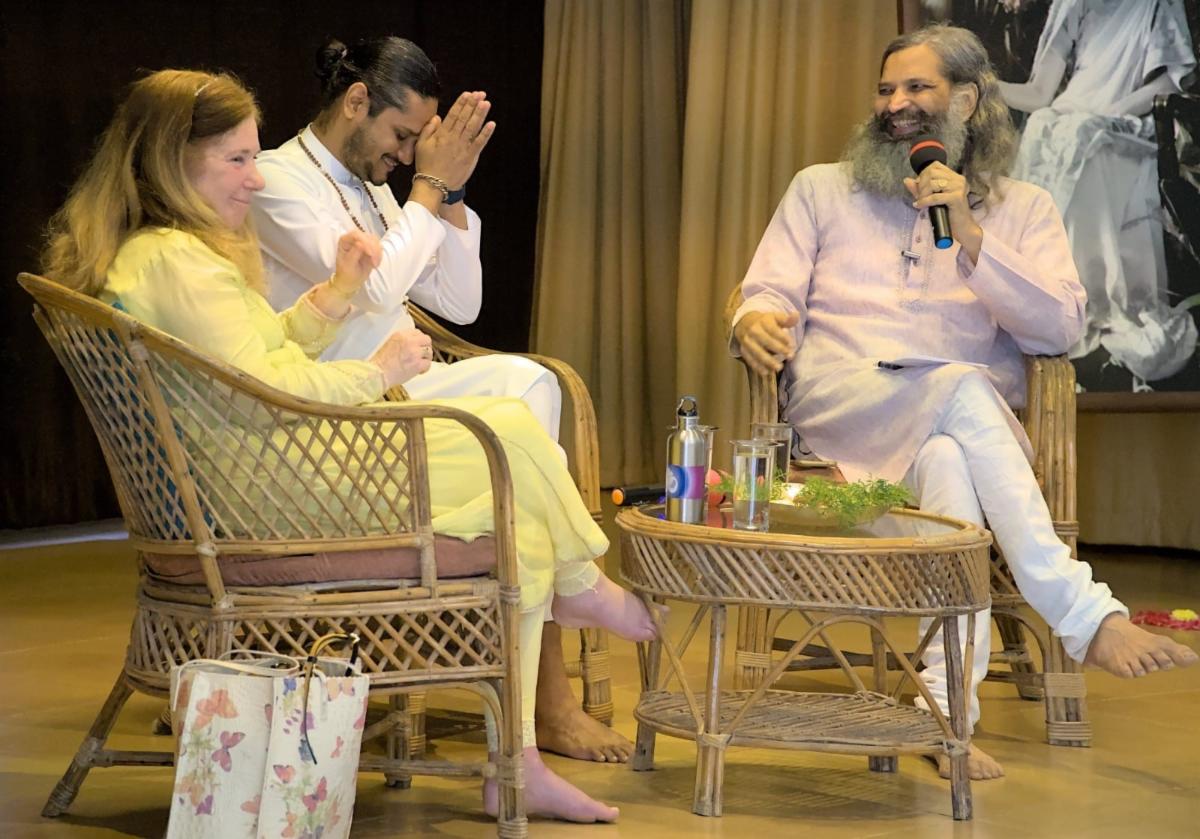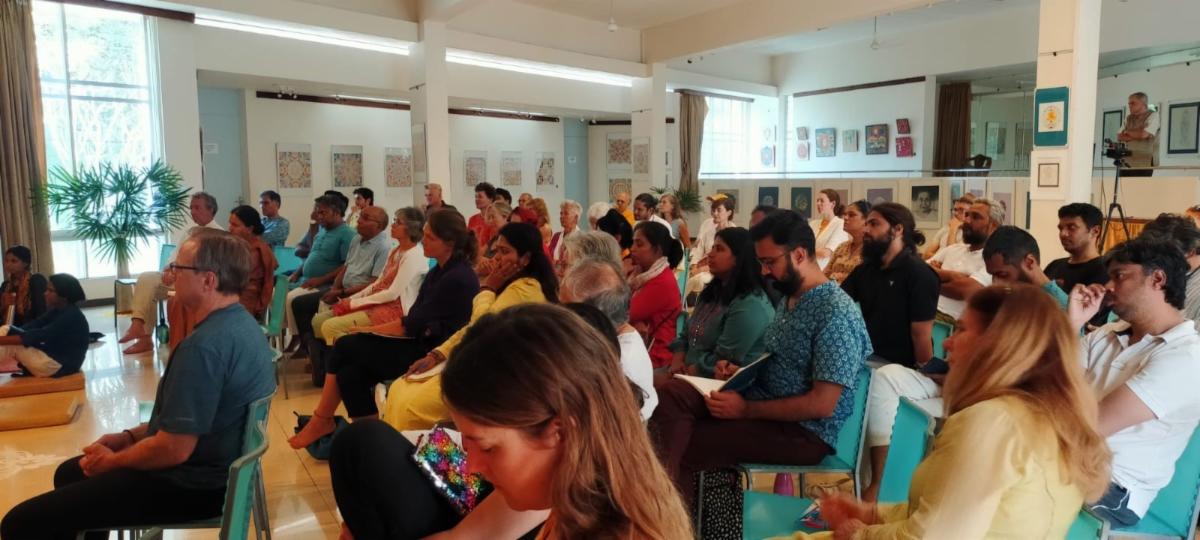|
“The world is preparing for a big change. Will you help?”
– The Mother, Auroville, India 1969
| |
|
Dr. Jayanti Ravi, Secretary of the Auroville Foundation with Dr. Tamilisai Soundararajan,
Lt. Gov. of Puducherry
| |
|
In February GPIW joined with The Auroville Foundation to organize a conference in Auroville, Pondicherry, India, called ‘Toward a Collective Awakening: Experiments in Evolution’. The four-day dialogue was opened by Dr. Jayanti Ravi and the Lt. Gov. of Puducherry, Dr. Tamilisai Soundararajan with words of welcome. Guests and speakers joined from the UK, US, Greece, the Dominican Republic and Uganda, Sri Lanka, Iran, and scholars and meditation practitioners from India, a delegation of young Indian changemakers, and members of the local Auroville community. Sri Aurobindo was one of India’s great sages, a poet, philosopher and prolific writer who lived from 1872 to 1950. Raising consciousness in the world was a great concern of Sri Aurobindo and The Mother, his spiritual feminine counterpart. They felt that the future of the Earth depends on this, and that delving inward to seek solutions was imperative. Real answers could be found in the underlying truth of our spiritual consciousness.
The dialogue explored how individual spiritual practice can effect change in the greater world community to quicken the shift needed in the collective. Each day discussions were held on themes that included education, meditation and spiritual practice, our sacred connection to the natural world, organizational cooperation, new integral economic models, and the power of communities to test governance models and alternative societal structures.
Below are some highlights. This is part one and a second newsletter soon to beshared will cover other insightful sessions. The entirety of the program was gracefully facilitated by the key coordinator on the ground, Ms. Sudha Prabhu.
| |
Manoj Pavitran, Co-Founder Purnam Centre for Integrality in Auroville, Raghu Ananthanarayan, Co-Founder, The Barefoot Academy for Governance, and Bhante Buddharakita, Founder, The Uganda Buddhist Center | |
|
Day 1: From Individual to Collective Sadhana with Manoj Pavitran, Director, Purnam Center for Integrality, and Ven. Bhante Buddharakita, Founder, Uganda Buddhist Center, moderated by Raghu Ananthanarayan, Co-Founder, The Barefoot Academy for Governance.
What are qualities that can maintain community once established? Bhante spoke as a longtime Buddhist monk, a tradition that has more than 2000 years of experience in monastic community living. Harmony, discipline, and generosity were some qualities needed to nurture a Buddhist (sangha) community. Those building the community must continuously reflect and remember why they are united here in the first place, what drew them and what is it that they wish to be free from? The more an individual can free himself from anger, greed, and delusion to more he can benefit his sangha and bring harmony to the whole.
Manoj Pavitran, who has lived in Auroville for 25 years and who has a deep understanding of the philosophy of Sri Aurobindo’s integral yoga said that in Auroville the situation is different; here we are looking at ordinary people who committed to an extraordinary adventure. The magnet that binds the community together is Sri Aurobindo’s writings on perfecting and purifying our ‘intelligent will’, this which guides our soul’s growth. Until it is purified its power can be hijacked by fear, anger, guilt, or jealousy.
In speaking about humanity’s development, Manoj reminded us that currently we measure physical and economic development through GDP. It is not enough to tell us how we are really doing. GNH (Gross National Happiness) developed in Bhutan takes happiness into account and adds further subjective indicators. Manoj indicated a need for a system that shows the development in a nation of the emotional being. For instance, what we refer to as ‘developed nations’, Japan and the UK have a Ministry of Loneliness. There are parts of India reporting that up to 60% of students are suffering from some sort of mental health challenge and this is spreading around the world. We need to research and develop systems models that can be an ‘integral development’ indicator – to map the ‘collective being’, our mental, emotional, and soul development. We can compare our world to the human body which is made up of trillions of cells working in a harmonious balance. A thorn in the foot brings discomfort to the whole body. Similarly, if we have a way to map the collective, a small community, a nation, or the world, it could indicate where there is an emotional imbalance and track this in real time. AI can provide rapid ways to process this data and we can act. Evolution is throwing up means by which thousands of people can cluster and develop collective self-awareness through the internet - a digital public infrastructure. Here technology plays a key role -- the internet is emerging as a brain of the Earth, but like a physical community it can also be used to spread rumors, gossip, and fear. What are ways that diverse communities around the planet can interact and what is the magnet that can unify? In unity, diversity can thrive. If there is no unity you will be replacing unity with uniformity -- that everyone does the same thing, and this is a danger that is developing on the world stage.
|  | |
Dena Merriam, Kriyacharya Tiyagi Shurjo, and Sraddhalu Ranade discuss taking our personal practice to the greater community of life -- to help build a strong spiritual collective, which would model new ways of governance, human unity, gift economies, and re-awakening to our sacred connection with natural world. | |
|
Our thoughts, prayers, and meditation have power and can help in our individual expanded consciousness. It can allow for access to greater intelligence, knowledge and wisdom. Surely there is a majestic power in the hearts of humans and can be shared if we can attune ourselves to the collective field. Dena Merriam spoke about meditation, that it is just the first part of spiritual practice, it must be taken into the rest of our day so that we don’t react negatively to external events. Spiritual and intentional communities are excellent places to practice – they can bring forth frictions, emotions, and reactions. But this can be to our advantage, giving us signs of where more inner work is needed. There is an inter-dependence between our individual evolution and the evolution of the community in which we live. If for example, when we experience fear and anger this too is shared with the quantum field. We are all contributing to what is going on in the world and the more we can resolve our own inner conflicts the more we can share an energy of love and cooperation that is so needed now. Self-reflection and self-awareness is needed as much as our meditation. Our own spiritual practice can give rise to more wisdom and inspiration, and bring awareness of how we can bring healing. Peace begins with me.
|  | |
|
“The future of the Earth depends on a change of consciousness. The only hope for the future is in a change of man's consciousness, and the change is bound to come. But is it left to man if they will collaborate for this change or if it will have to be enforced upon them by the power of crashing circumstances.
So, wake up and collaborate!”
-- The Mother, Auroville, 1964
| |
Georgia Dousikou, of Greece with Sudha Prabhu, Conference Coordinator and Facilitator and Arun Selvam of Auroville. | |
|
Jeff Genung, Managing Director, Pro-Social World, Kiran Bali, interfaith and organizational leader, with Dr. Vinya Ariyaratne, President of the Sarvodaya Shramadana Movement in Sri Lanka led a session on Social Evolution and the Science of Cooperation.
| |
Social Evolution and the Science of Cooperation
Dr. Vinya Ariyaratne spoke of his father, Dr. A.T. Ariyaratne, who when he was a 29-year-old science teacher at a Buddhist high school in Sri Lanka along with a group of teachers and students decided to take learning outside the classroom. They traveled to an impoverished and remote village in the countryside as an experiment. The teachers and students lived with the people in the village and tried to understand their needs. He took his inspiration from Buddhist and Gandhian philosophy – love and the sharing of resources toward the awakening of all. Out of his work a development model of action was born, and the group traveled from village to village. Village leaders in one place would then move on to train other villages. They called it the Sarvodaya | Sri Lanka's Sarvodaya Shramadana Movement and to this day, after 60 years of mostly volunteer work, they have reached more than 15,000 villages. This organic grassroots movement made up of volunteers alongside the local villagers helped to build roads, bridges, schools, and bring clean water environmental sanitation systems, all using appropriate technologies – something many global banks, NGO’s and governments would have had difficulty accomplishing at such scale. Having a road meant the remote village could have access to government services, medical help, and it also meant they could sell their products and services. It is compassion in action and those involved experience an outpouring of heartfulness – both the givers and receivers take immense joy in the work. The movement is still very active, and although it now receives donor funds, their main source of support is still from volunteer labor. They have 5400 village based independent societies which follow the movement’s philosophy and have created a financial institution owned by village organizations. The metro economics, capitalist system and market economy are not at all conducive to the village base empowering process that satisfies people’s needs, not wants or greed. They created real models for living in harmony that naturally honors the Earth. Dr. Vinya says that in this work the individual experiences his own inner transformation in parallel to the outer transformation witnessed in society.
Kiran Bali a dynamic organizer and leader in the interfaith movement has been inspiring local communities and local leaders, in particular women, around the world to become active at local levels and not succumb to discouragement, but rather witnessing many hopeful signs of change.
| |
Marti of Auroville, lifetime activist, organizer, photographer, writer, and artist with Daniel Abreu, speaker, educator, and young ecology leader with his book 'Kai and the Song of Mother Earth' written for the children of the Dominican Republic inspiring them to act to protect their biodiversity. | |
|
Listen to the complete panels of the first day sessions by clicking the video link above.
| | | | |